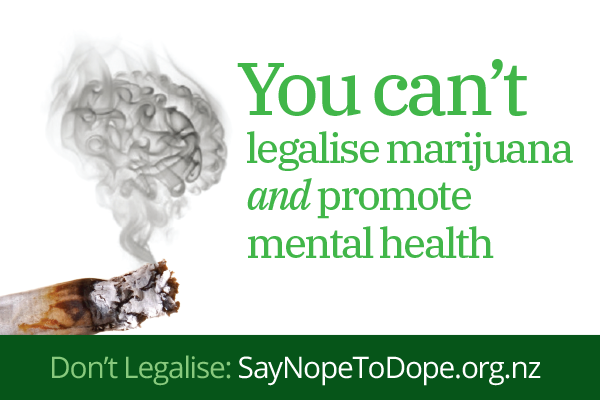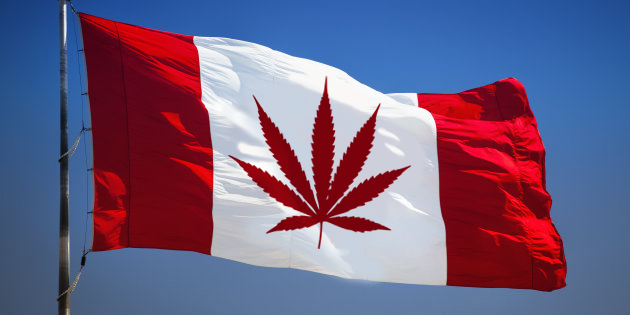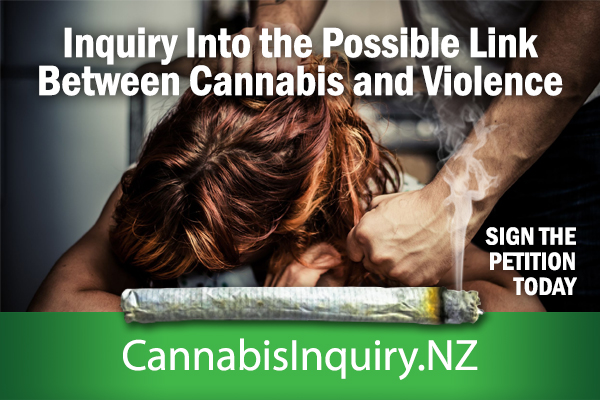
 Bob McCoskrie asks why an ‘investigative’ journalist is so desperate to shut down a petition calling on an inquiry into the possible harms of cannabis. Mau doesn’t want you to go anywhere near it. What is she scared of? Below is our response. We would encourage you to take a few minutes to read it. The cannabis debate deserves robust and balanced debate. That may be difficult to get with the current NZ media. It is disappointing that the Sunday Star Times refused to allow us the opportunity to respond in full, despite repeated requests. Once you have read it, please take a moment to sign the petition that Alison Mau is so scared of!
Bob McCoskrie asks why an ‘investigative’ journalist is so desperate to shut down a petition calling on an inquiry into the possible harms of cannabis. Mau doesn’t want you to go anywhere near it. What is she scared of? Below is our response. We would encourage you to take a few minutes to read it. The cannabis debate deserves robust and balanced debate. That may be difficult to get with the current NZ media. It is disappointing that the Sunday Star Times refused to allow us the opportunity to respond in full, despite repeated requests. Once you have read it, please take a moment to sign the petition that Alison Mau is so scared of!
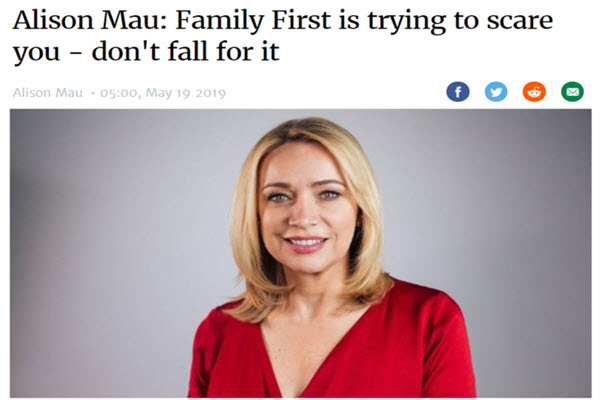 24 May 2019
24 May 2019
Alison Mau, an ‘investigative’ journalist, is desperate to shut down our petition (“Family First is trying to scare you – don’t fall for it” 19 May 2019) which simply calls for an investigation into a possible link between cannabis and violence – emphasis on ‘possible’.
Firstly, some background. Over the past couple of decades, studies around the globe have found that higher levels of THC – the active compound in cannabis – is strongly linked to psychosis, schizophrenia, and violence. A certain percentage of people who use marijuana can become psychotic and can also become violent.
And with increasing THC levels being found in marijuana products consumed via edibles, vaping, and dabbing, the risk is growing. For example, in Colorado the average THC content of all tested flower in 2017 was 19.6% statewide compared to 16.4% in 2014. The average potency of concentrated extract products has increased steadily to THC content 68.6% at the end of 2017. Potency rates of up to 95% have been recorded and today can be as high as 99.9% THC.
Researchers have studied alcohol and violence for generations, proving that alcohol is a risk factor for domestic abuse and assault. Far less work has been done on cannabis.
And that’s effectively the work that we’d like to see done – before we move to legalise it.
We would argue that the evidence is already building.
A just-published study in The Lancet concluded that “people who smoked marijuana on a daily basis were three times more likely to be diagnosed with psychosis compared with people who never used the drug. For those who used high-potency marijuana daily, the risk jumped to nearly five times.”
Last year, researchers at Ohio and Tennessee Universities found that marijuana use was associated with psychological, physical, and sexual intimate partner violence. A University of Florida study published in The Journal of Interpersonal Violence in 2011 found that frequent marijuana users in adolescence are twice as likely to engage in domestic violence as young adults. You would think this would draw attention from Mau.
Research published in 2016 in the journal Psychological Medicine concluded that continued cannabis use is associated with 7-fold greater odds for subsequent commission of violent crimes.
A 2007 paper in the Medical Journal of Australia looked at 88 defendants who had committed homicide during psychotic episodes. It found that most of the killers believed they were in danger from the victim, and almost two-thirds reported misusing cannabis – more than alcohol and amphetamines combined.
As with all research, of course there are limitations in the studies mentioned above. But those same limitations also apply to studies which say there is no association.
The United Nations Office on Drugs and Crime (UNODC) summed up the issue in their 2012 report, saying that THC content and the potency of cannabis have been increasing over the past 30 years, and that this can increase psychotic symptoms in regular users.

Here in New Zealand, just last year, a man who stalked several women during a 24-hour drug-induced psychosis left one of his victims with “a lasting fear”. He lost his job after failing a drug test and then embarked on a four-day cannabis binge. The judge said that resulted in a psychosis.
Earlier this month in California, Bryn Spejcher, an employed, well-educated 28-year-old with no criminal record or history of mental illness appeared in court accused of stabbing her boyfriend to death — after smoking pot for the first time. The coroner testified that the victim had been stabbed 108 times, from his head to his knees, cutting his trachea, jugular vein and carotid artery and perforating his heart twice. A forensic scientist from the crime lab confirmed that no drug other than THC was present in Bryn’s blood and no drug other than THC was found in the bong.
Paranoia and psychosis can make some people dangerous, so a rising use of a drug that causes both would be expected to increase violent crime, rather than reduce it as drug advocates might claim.
Here in New Zealand, we know from a number of governmental reports (UNICEF reports in 2003 and 2007, a CYF report in 2006, and a Children’s Commissioner report in 2009) that one of the factors most commonly associated with the maltreatment of children is drug abuse.
Last year, Texas released its report on child abuse deaths, finding half the 172 child abuse deaths in 2017 coupled with substance abuse. Marijuana was the most-used substance connected to child abuse and neglect deaths, followed by alcohol, cocaine and methamphetamine. In 2017, Arizona also published a report showing that marijuana was the substance most often linked to child abuse deaths.

But it is the most recent study that we should sit up and take notice of. The paper “Cannabis use and violence in patients with severe mental illnesses: A meta-analytical investigation” published last month is the most comprehensive survey yet on the issue. Findings showed a moderate cannabis-violence association in severe mental illness. What’s also striking is how recent most of the papers examined are – 10 of the 12 papers are in the last decade, and 7 of the 12 since 2016.
Mau contacted Otago University associate professor Joseph Boden – the Deputy Director of the superb Christchurch Health and Development study. So did I. Boden is in favour of some form of legalisation. In our respectful phone discussion, we both agreed that high-THC cannabis would increase the risks.
He argued that a regulated legalised market in New Zealand would keep this risk down by limiting THC levels. It’s a nice theory, but I’ve been to Colorado and California. Regulation simply empowers a black market – as is being seen in Colorado, California, and now Canada.
Mau also relies on comments from Ziva Cooper from the Cannabis Research Initiative at UCLA, where she works, solicits and takes money from cannabis users and investors in the industry. Insys, the company with which she collaborated from 2015-2018, is a poster child for terrible behaviour in the opioid crisis.
Mau also refers to ‘the scientific community’ of 75 academics and medical professionals who wrote an open letter opposing the premise of our petition. She forgot to mention the lobbyists from NORML and the Drug Policy Alliance in that list.
She also conveniently left out the bit that the signatories reiterated “their support for an end to marijuana prohibition and for the legal regulation of marijuana for adult use.”
Ironically, Mr Boden told me he used to live in Massachusetts. Just this month, more than 40 clinicians, researchers, scientists, and other public health professionals from Massachusetts, including many from Harvard Medical School, released a Statement of Concern, highlighting negative effects of THC, including “Increased risk of serious mental health problems including acute psychosis (e.g., hallucinations, delusions), paranoia, schizophrenia, depression, anxiety, and suicide, with growing scientific evidence that daily use of high THC products bring greater risk”. They highlight 2018 research from the Copenhagen University Hospital which found that “41% of those who experience cannabis-induced psychosis later convert to schizophrenia.”
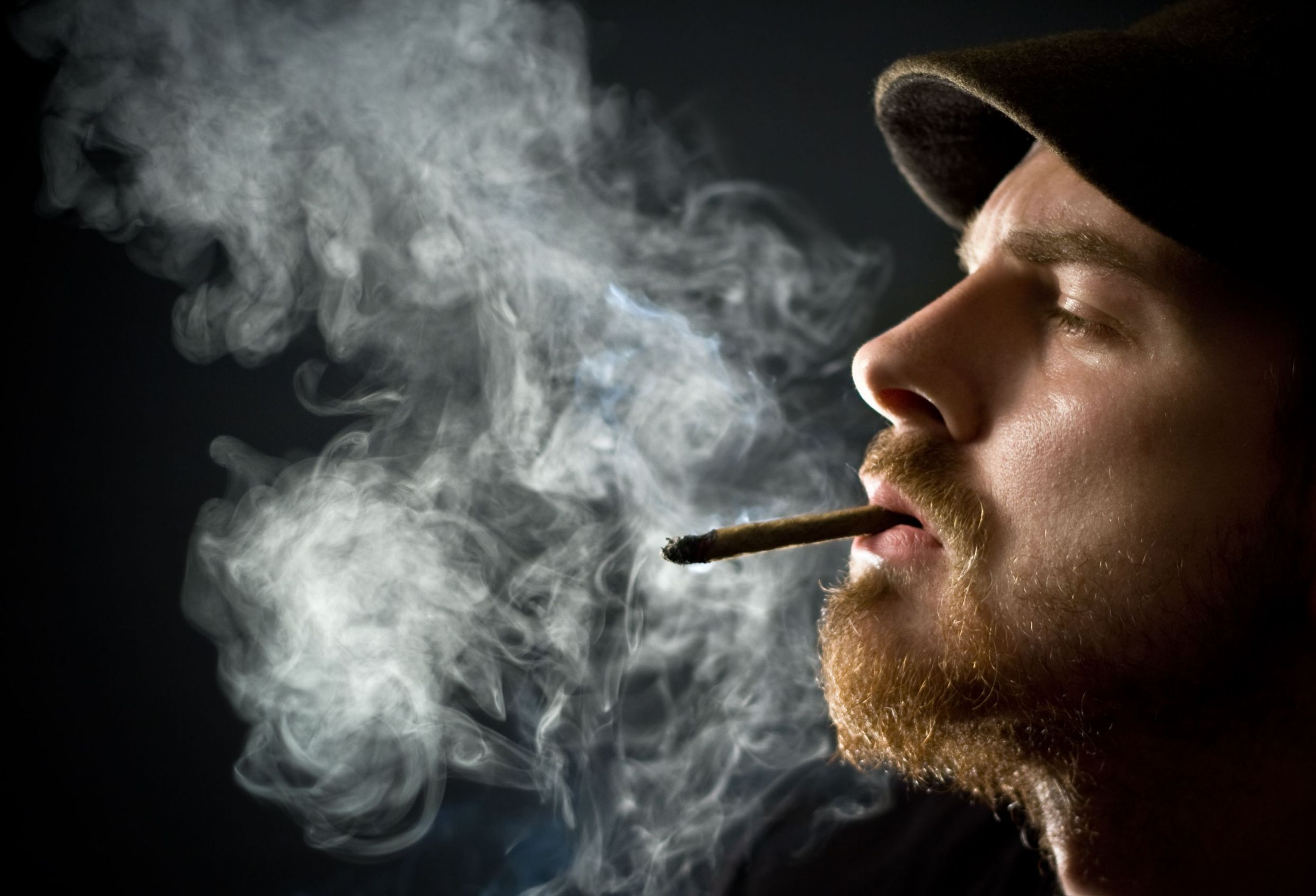 Last month in the liberal state of Vermont, the Department of Mental Health has warned legislators about the mental health implications of a commercial market, stating, “Perhaps the strongest evidence for severe mental health problems related to cannabis use is related to psychosis were multiple studies have linked regular cannabis use to an estimated doubling of the risk of a psychotic illness as well a more refractory course among people with existing psychotic illness. Violent behavior as a result of cannabis induced paranoia and other psychotic symptoms is also an increasing concern.”
Last month in the liberal state of Vermont, the Department of Mental Health has warned legislators about the mental health implications of a commercial market, stating, “Perhaps the strongest evidence for severe mental health problems related to cannabis use is related to psychosis were multiple studies have linked regular cannabis use to an estimated doubling of the risk of a psychotic illness as well a more refractory course among people with existing psychotic illness. Violent behavior as a result of cannabis induced paranoia and other psychotic symptoms is also an increasing concern.”
In Maryland, neuroscientist and author of “The Impact of Marijuana on Mental Health in: Contemporary Health Issues on Marijuana” Christine Miller warned legislators last month, “The causal link between marijuana use and the development of psychosis is quite simply the most well-replicated, high-impact finding in schizophrenia research today. Given current use rates and the strong potency of the drug available, it stands to be responsible for a larger proportion of schizophrenia cases than any other established factor. Who may be at risk cannot be reliably predicted.”
Here’s the bottom line.
In the same way that there is some real evidence that components of marijuana can be made into medicine, it is based mainly on anecdotal ‘evidence’ that makes us think we should really study it more to isolate components and potentially treat other illnesses with them.
In the same way, there is building scientific evidence suggesting that components of the plant can lead to mental illness, at times severe, that can lead to violence. There is already anecdotal ‘evidence’ that higher THC-levels can lead to violence.
We are simply asking for research and scientific consensus before moving forward as a country with a change this massive. We believe this to be a responsible and thoughtful way to move forward.
But Mau doesn’t want you to go anywhere near it. What is she scared of?

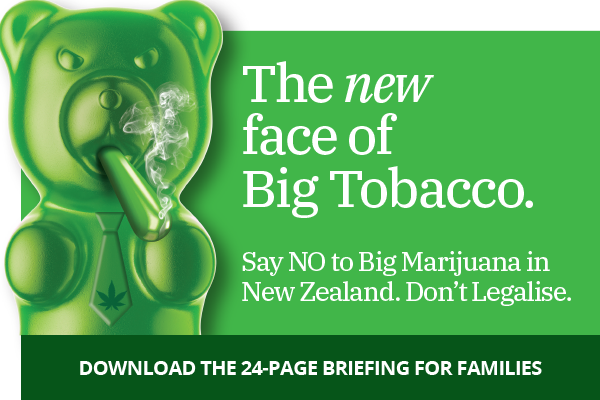
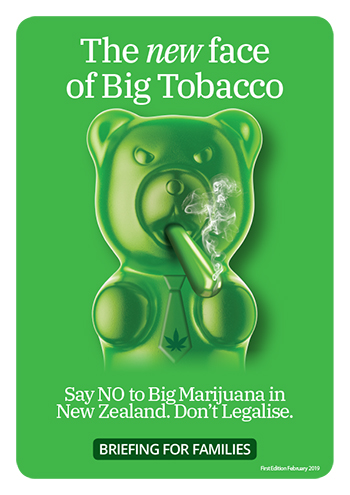 Media Release 4 Sep 2019
Media Release 4 Sep 2019
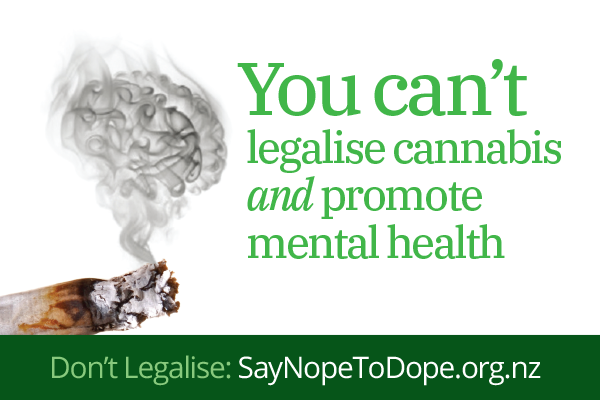
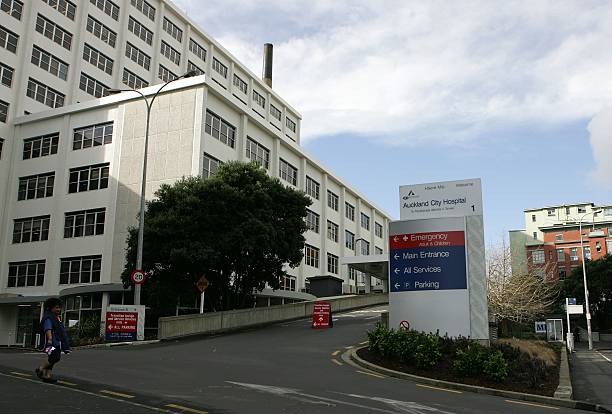
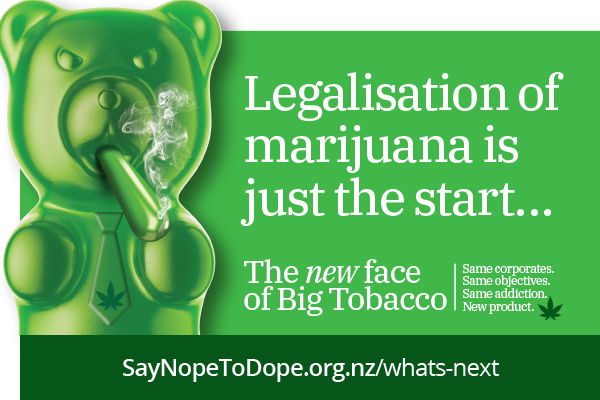
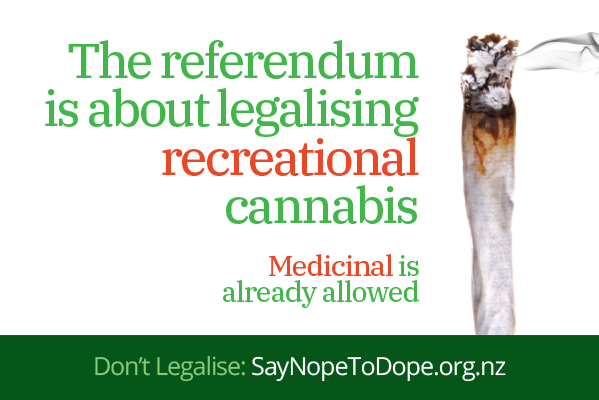
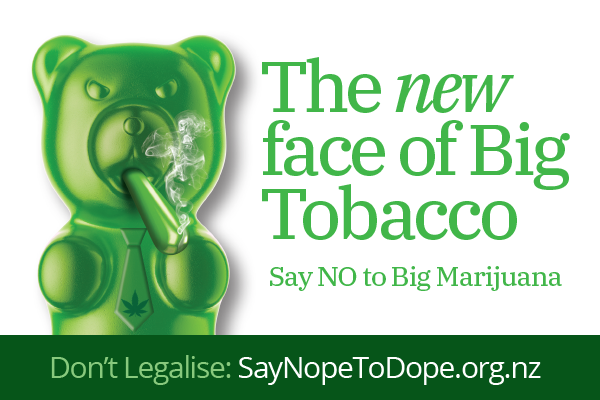

 Bob McCoskrie asks why an ‘investigative’ journalist is so desperate to shut down a petition calling on an inquiry into the possible harms of cannabis. Mau doesn’t want you to go anywhere near it. What is she scared of? Below is our response. We would encourage you to take a few minutes to read it. The cannabis debate deserves robust and balanced debate. That may be difficult to get with the current NZ media. It is disappointing that the Sunday Star Times refused to allow us the opportunity to respond in full, despite repeated requests. Once you have read it, please take a moment to
Bob McCoskrie asks why an ‘investigative’ journalist is so desperate to shut down a petition calling on an inquiry into the possible harms of cannabis. Mau doesn’t want you to go anywhere near it. What is she scared of? Below is our response. We would encourage you to take a few minutes to read it. The cannabis debate deserves robust and balanced debate. That may be difficult to get with the current NZ media. It is disappointing that the Sunday Star Times refused to allow us the opportunity to respond in full, despite repeated requests. Once you have read it, please take a moment to 


 Last month in the liberal state of Vermont, the
Last month in the liberal state of Vermont, the 
